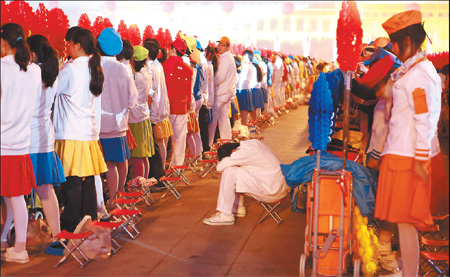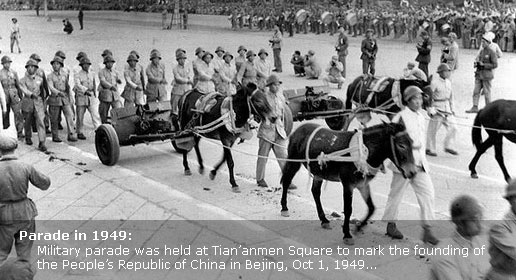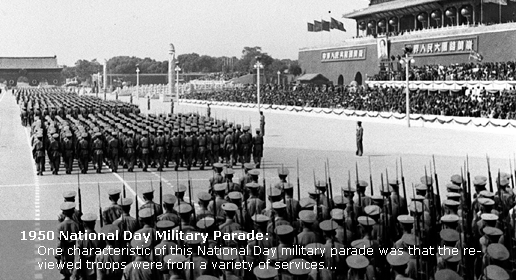Celebrations
'Let's practice standing'
By Quan Xiaoshu and Liu Qi (China Daily)
Updated: 2009-09-22 10:15
|
|
It's 6 am.
Ji Yulin's daughter looks out of the window and is delighted to find that it is raining -- perhaps her drills for the National Day parade will be cancelled today?
But no such luck.
Ji Yulin, who is reluctant to reveal his daughter's name, takes her to the Beijing No 2 Middle School as usual and then moves on to the school's sub-campus, a 10-minute walk away, where he works as an instructor, to lead his own students through rehearsals.
Ji, 44, who took part in the parades for the nation's 35th and 50th anniversaries, will march with his students along Chang'an Avenue, the main east-west thoroughfare in Beijing, and pass Tian'anmen Rostrum, where Chairman Mao Zedong declared the founding of New China in 1949.
A special committee for the parade, set up in March, decided to include students from dozens of Beijing colleges, primary and middle schools in the celebration.
Many believe the parade is a once-in-a-life-time experience.
But not everyone agrees. Zhang Tianyi, an undergraduate student at Beijing Foreign Studies University, says he would love to watch the National Day parade. But a notice from the school requiring him to participate had thrown awry all his summer plans, which included an internship, a tour to Shenzhen and a hometown visit.
"I don't think it's bad that students have different ideas about the parade. They should be allowed to choose whether or not to participate," says Yang Yiyin, of the Chinese Academy of Social Sciences (CASS).
Meanwhile, at the Beijing No 2 Middle School, heavy rain forces the students to move indoors. But the drill continues.
"Today we'll practice standing, as we have to stand for a long time on National Day and it's not easy without practice," Ji tells his students.
They also practice waving flowers and flipping cards in measured movements.
In total, 900 students from Ji's school, including his daughter, will participate in the parade. They will hold a bunch of plastic flowers at Tian'anmen Square on Oct 1 to make the characters for "National Day" and "long live China".
As in previous parades, the country's leadership will inspect from the Tian'anmen Rostrum phalanxes of soldiers, students and others from all walks of life.
Like many of his students, Ji's daughter seems unmoved by the event, in sharp contrast to the excitement he felt about the previous two parades.
When the school first mobilized students in February for the parade, Ji's daughter was unwilling to join. "The drills are demanding and may take away my study time," she said.
Both her parents and her teachers tried to motivate her.
"It will be a rare, memorable and worthwhile experience, something you will realize only when you are there," encouraged Ji's wife.
The daughter finally agreed and the drills started in July. "We trained from 7 to 10:30 each morning, with no free weekends, except for a two-week break during the summer vacation," Ji says, adding that "running and leg lifting are part of the daily routine and are aimed at improving students' physical fitness".
Although Ji's daughter rarely complains, he can sense that the zeal he felt in 1984 is clearly missing in her. Then a 19-year-old high school graduate, he and his classmates regarded it a great honor to be part of the National Day parade.
Teachers had to persuade students in poor health to withdraw from the parade, he recalls.
The parade in 1984 to mark the 35th anniversary of New China, the first in 24 years, was deemed a significant display of national strength and progress. Parades were an annual feature on Oct 1, between 1949 and 1959. After 1984, only the 50th anniversary of the People's Republic was celebrated with a parade in 1999.
"We assembled at 5 am and got to Nanchizi Street, a 15-minute walk from Tian'anmen Square, at 6 am, where we waited until noon to walk to Chang'an Avenue," Ji recalls of his first parade.
Many of the balloons meant for release as they walked past Tian'anmen Square had drifted away during the wait, he says.
Ji and his classmates returned to school after midnight, in high spirits.
"There was no bus. Cars and even bicycles were still luxuries for ordinary families. Many students living far from school slept in the classroom that night. We were all very excited," he says.
Li Chunling, from CASS, attributed such passion to common values and an interest in politics.
"But this only-child generation, including Ji's daughter, has more diverse values, owing to the more open and informed environment. They also face fiercer competition in terms of school exams and jobs, making them more pragmatic," Li says.
Dong Zhenggang, a post-graduate student at Tsinghua University, who is suntanned from the drills, says students' views should be taken into consideration when National Day celebrations are planned, to encourage more enthusiasm and to make the celebrations more lively.
"There are many more ways to show our love for this country," Dong says.
Tan Jing, an undergraduate student at Peking University, says the parade should include students from outside Beijing.
Peng Liangfang, from the Dongcheng district education commission in Beijing, says it's natural for students to see the parade differently from their parents' generation, as they are influenced by multiple cultures and tend to express their ideas openly.
But she insists that drills are a good test of whether their will and health can withstand the arduous discipline. Today's students tend to bury themselves in online games or after-class tutoring, she says.
"Give them some time, and they will realize the meaning some day," Peng says.













